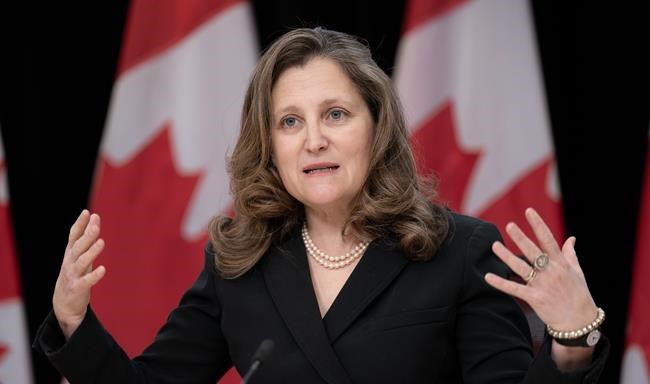
OTTAWA — Finance Minister Chrystia Freeland will present the federal budget on April 16, as cost-of-living issues continue to dominate Canadian politics.
OTTAWA — Finance Minister Chrystia Freeland will present the federal budget on April 16, as cost-of-living issues continue to dominate Canadian politics.
“Our economic plan is about building more homes, faster, making life more affordable, and creating more good jobs,” Freeland said in a news release on Monday.
The spending plan is coming at a time when high interest rates are putting a damper on the economy and ramping up fiscal pressure on the Liberal government.
At the same time, the political cost of inaction on housing could be high, as rents skyrocket across the country and homeownership remains out of reach for many Canadians.
Conservative Leader Pierre Poilievre has mounted a fiery attack on Prime Minister Justin Trudeau over housing affordability, earning his party a double-digit lead over the Liberals.
Dwindling support for the governing Liberals forced the government to shift its focus to housing in the fall with a slew of new — but modest — measures aimed at increasing housing supply.
Housing Minister Sean Fraser is expected to unveil a plan soon that outlines how the Liberals intend to get more homes built and ease affordability.
But big-ticket items are unlikely to come through in the budget, if Freeland is to follow through with her promise of fiscal restraint.
The finance minister recently reiterated her commitment to new fiscal guardrails introduced in the fall that would limit deficits.
“For our government, it is very, very important to invest in Canada and Canadians … and to do so in a fiscally responsible way,” Freeland told reporters ahead of the introduction of pharmacare legislation last week.
“We laid out in the fall economic statement some fiscal guideposts, and we will meet them.”
The federal government pledged in the fall that the current fiscal year’s deficit would not get any bigger than its projection of $40.1 billion.
According to the Finance Department, the federal deficit for the current fiscal year stood at $23.6 billion by the end of December.
The government is also looking to lower the debt-to-GDP ratio in 2024-25 relative to the projection in the fall economic statement, and keep deficits below one per cent of GDP beginning in 2026-27.
The Business Council of Canada is calling on Ottawa to “avoid introducing net new spending” to help ease inflation.
This report by The Canadian Press was first published March 4, 2024.
Nojoud Al Mallees, The Canadian Press



